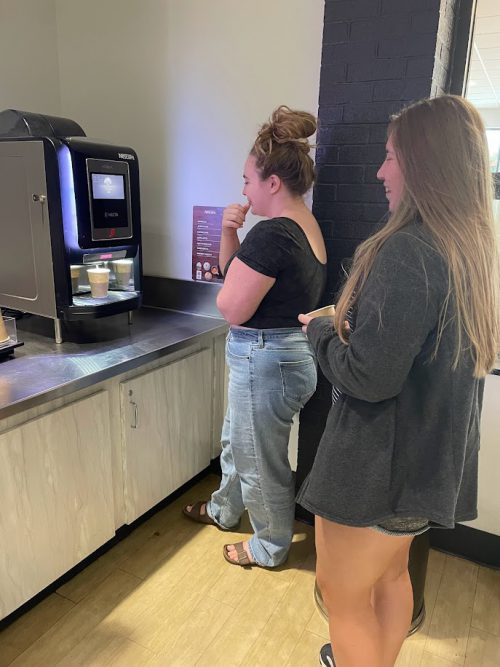Featured Image: Students form a line at Boyd Dining Hall’s new Nescafé coffee machine for freshly made drinks. Lily Reslink | Marlin Chronicle
With the new coffee machine in the dining hall, the Keurig installed by SGA in the 24/7 Study, Starbucks as a longtime staple in the Harbor Grille and the Lighthouse’s free coffee that runs dry by the end of the work day, the claim that college students run on coffee has substantial grounds, no pun intended.
Senior Alyssa Lane said, “I started drinking caffeine when I was in college. I probably have about four cups of coffee a day now.”
Even long-time consumers of caffeine have found a greater need for it upon entering college. Sophomore Kyla Robberecht said, “I’ve been drinking coffee since I was about 10, and I get migraines without it.” College has only upped her intake. “Coffee is my blood at this point,” Robberecht said.
Most coffee consumers don’t enjoy the drink just for its taste, but rather the caffeine boost. Coffee is not the sole source either.
Energy drinks, such as Celsius, line the Coastal Market shelves.
Lena Rudolph, Coastal Market supervisor, said that the market has energy drink regulars, and students who come in to get two or three cans of Celsius at a time. “We’re always filling the case back up,” Rudolph said.
Celsius has capitalized on this target audience, launching a college student ambassador program. Their website says, “Join our team of college ambassadors and LIVE FIT on your campus! CELSIUS is on the look-out for college students who can spread awareness on all things CELSIUS across their campus, and on social media!”
The site includes a series of quotes from the college ambassadors about how Celsius pumps them up for the gym during the day and keeps them awake for homework all night.
This goes to show that, for many college students, a world without caffeine is unthinkable.
Caffeine consumption remains prevalent regardless of student status, but the demanding schedules of college students play a part in driving this particular demographic to rely on it.
Senior Alexis Bailey said that her caffeine intake began when she started AP classes in high school. “I had way more work and I needed to be up later,” Bailey said. “I needed the caffeine to keep me going.”
It is not uncommon for students to turn to caffeine to cope with the demands of their schedule.
Long, exhausting days drove sophomore Alec Gordon, a Biology major, to start drinking caffeine regularly.
Gordon described how on a typical day, he wakes up at 5:30 a.m. for lacrosse practice and finishes classes around 4:30 p.m. Beyond this, Gordon is left with additional responsibilities such as homework and lifting in the gym.
Gordon elaborated on the time-consuming responsibilities that come with being in college. “It’s making you have to stay up later. It’s making you have to wake up earlier. It’s making you have to go from your normal eight hours of sleep down to three or four,” Gordon said.
Daily, Gordon said that he consumes one “high density caffeinated beverage” and then an additional cup of coffee to cure his afternoon slump.
“I drink it to stay awake so I can do what I need to get done,” Gordon said. Without such a demanding schedule, Gordon said he would probably be less inclined to have as much caffeine.
Gordon also offered a biology perspective, explaining how the body may reach a point where it resists caffeine, and needs more for the same effect.

Celsius energy drinks are for sale in the Coastal Market. Ross Winner | Marlin Chronicle
As for additional problems that the overconsumption of caffeine may pose, Bailey said, “lack of sleep is always a big issue when you’re relying more on caffeine than you are on sleep.” She brought up how this reliance could even become dangerous for those driving.
Junior Max Byrd mentioned heart problems as another potential concern.
Ultimately, Bailey and Byrd both said that they could get through a day without caffeine, but not everyone can do so quite as easily.
Beyond just college students, this phenomenon of caffeine dependence is recognized by psychiatric specialists.
According to an article from addictioncenter.com, “The American Psychiatric Association (APA) does not currently identify Caffeine addiction as a Substance Use Disorder (SUD); however, it does recognize Caffeine withdrawal as a clinical condition.”
The DSM-5, The Diagnostic and Statistical Manual of Mental Disorders, includes several caffeine-related diagnoses: Caffeine Intoxication, Caffeine Withdrawal, Other Caffeine-Induced Disorders (e.g., Anxiety and Sleep Disorders) and Unspecified Caffeine-Related Disorder.
Caffeine continues to play an enormous role in society today, especially with its range of uses and effects.
For example, not everyone uses caffeine to stay awake. Toren Greenfield-Tuthill said that he uses coffee as a stand-in for ADD medication. Without it, Greenfield-Tuthill said, “I won’t be able to focus.” While he said that he could get through a day without it, he would find it very hard to be productive.
Senior Rob Lindsay also spoke on the focus benefits caffeine provides him. “It’s becoming a necessity, which is a little bit of an issue,” Lindsay said. Like Gordon, Lindsay also said that he would most definitely drink less caffeine if his schedule was less busy.
In terms of caffeine’s longevity, Lindsay said, “It’s been here for centuries,” so it’s bound to stick around for a lot longer.
By Lily Reslink
